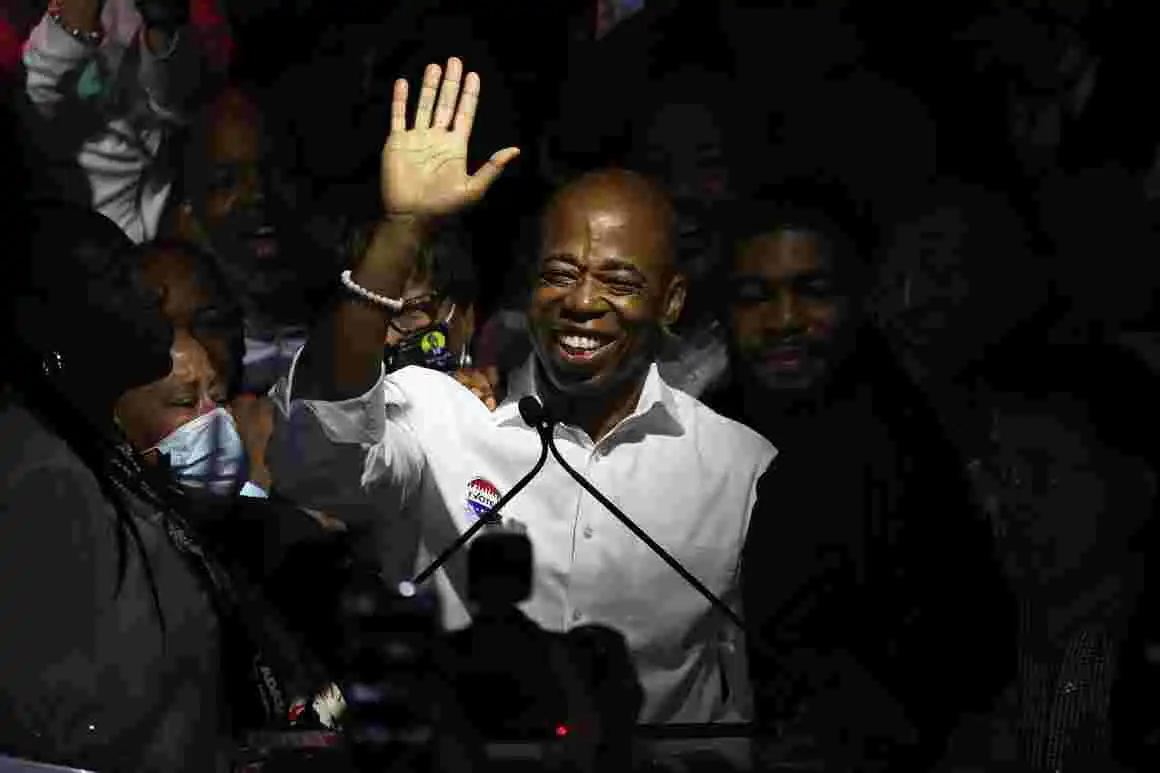
New York City mayoral candidate Eric Adams speaks during his Election night party in the Williamsburg neighborhood of Brooklyn borough. | Michael M. Santiago/Getty Images
NEW YORK — A confident Eric Adams declared himself the “face of the new Democratic Party” on Thursday, two days after voters delivered him a decisive lead in the primary to replace outgoing Mayor Bill de Blasio.
The remarks, delivered during a press conference outside Brooklyn Borough Hall where he works as borough president, were a broadside against the far-left flank of the party that organized to block Adams and fourth-place finisher Andrew Yang.
“Look at me and you’re seeing the future of the Democratic Party. If the Democratic Party fails to recognize what we did here in New York, they’re going to have a problem in the midterm elections and they’re going to have a problem in the presidential election,” Adams said during a wide-ranging event that was occasionally interrupted by supportive horn honks, cheers and a passerby who sniped at Adams’ close relationship with Brooklyn party attorney Frank Carone.
“America is saying, we want to have justice and safety and end inequalities and we don’t want fancy candidates,” Adams said in an apparent dig at Maya Wiley — a Dartmouth-educated attorney who ran on a police reform agenda and came in second place Tuesday night.
The final results will not be released until the Board of Elections tabulates absentee and ranked-choice ballots in the coming weeks. As of now, Adams was ranked first for 253,234 Democrats, securing 31 percent of the vote to Wiley’s 22 percent. Previous city sanitation commissioner Kathryn Garcia finished third with 155,812 first-place votes.
Adams, a 22-year police officer who retired as captain to run for state Senate, campaigned nearly singularly on the increase in gun violence across the five boroughs. The message resonated as shootings continued to climb during the election. In addition to his resume, Adams spoke openly about being beaten by police as a poor, Black teen in Southeast Queens, providing him biographical reference points for both sides of a heated debate.
He often admonished self-identified progressives; after the Derek Chauvin verdict in the George Floyd murder trial, Adams likened protests to “throwing a Molotov cocktail” and said he spent the day showing his son precinct stationhouses where he and other Black people were assaulted by cops.
Wiley, by comparison, called for a funding cut to the NYPD, coupled with more social service resources to address mental illness and other conditions that can lead to crime.
“We've allowed a group to hijack the term progressive,” Adams said. “So what I’m saying to the Democratic Party — stop believing a numerical minority is what the numerical majority is.”
“New Yorkers and Americans want to be safe and they don’t want to exist on programs; they want to exist on possibilities and opportunities,” he added. “I believe my message is going to cascade across the entire country.”
A super PAC that raised money to block Adams and ultimately supported Wiley’s candidacy took issue with his remarks.
"Claiming a national mandate and antagonizing potential allies isn't the best look for somebody who hasn't even won their election yet, let alone delivered on any of their promises,” Our City executive director Gabe Tobias said. “Progressives will work with anyone to achieve results for New Yorkers — but we demand leaders focused on those results, not their own egos."
And Christina Greer, a local and national political commentator, cautioned Adams against assuming too broad a mandate.
“We've several faces of the Democratic Party. He is but one of them, but to say that he is the only face is not realistic,” Greer said. She noted the victory of India Walton, the Democratic Socialists of America’s pick, in the Buffalo mayor’s race. “[Adams] represents just one faction of Black politics; he represents just one faction of the Democratic Party.”